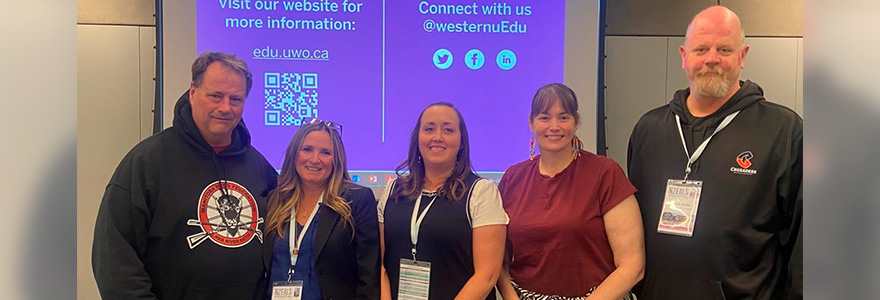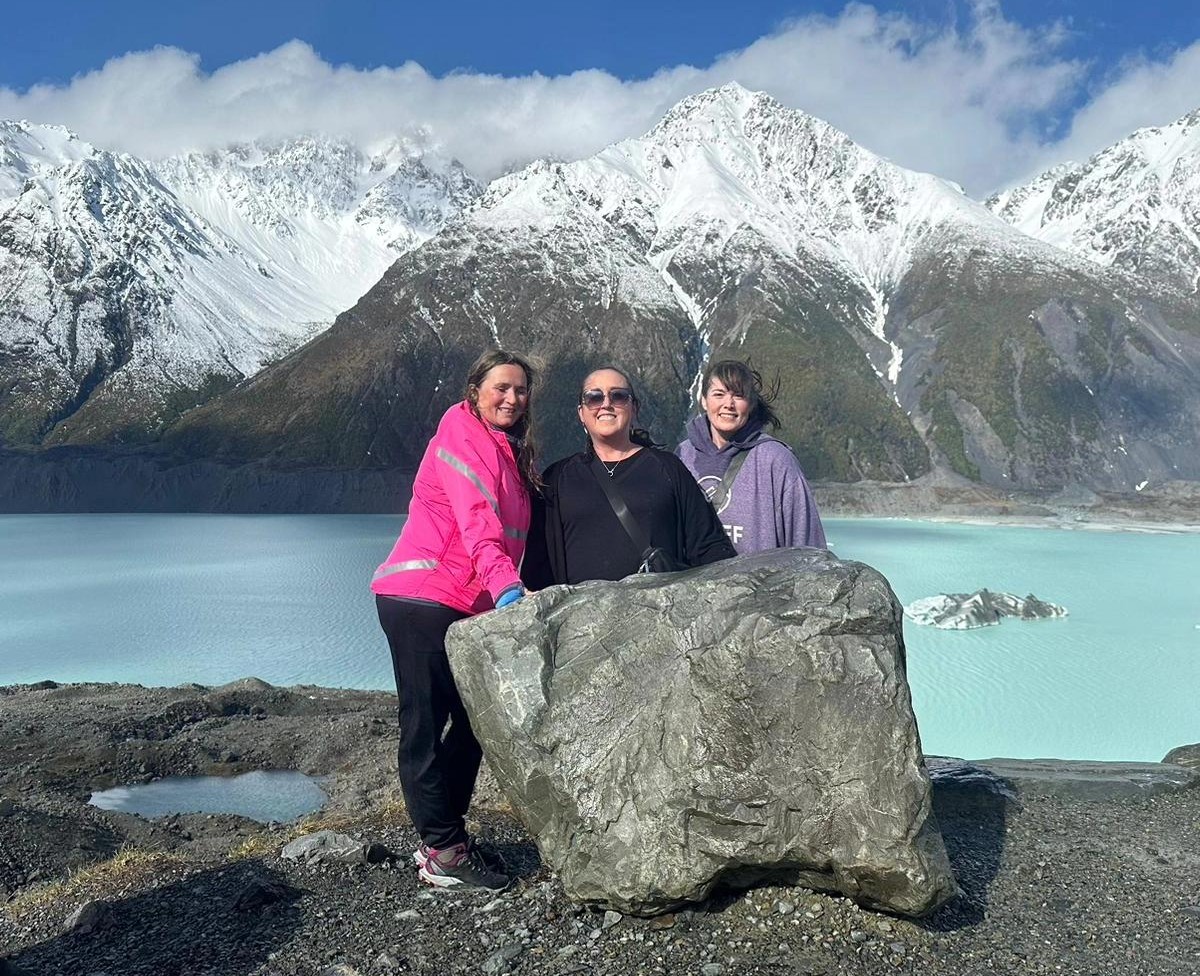
From left to right: Assistant Professor Dr. Scott Lowrey is joined by his Doctor of Education candidates Drs. Lindy Phelps-Henderson, Shelly Hopper, Nicole Brouwer, and Wayne Davies, who graduated in October.

From left to right: Assistant Professor Dr. Scott Lowrey is joined by his Doctor of Education candidates Drs. Lindy Phelps-Henderson, Shelly Hopper, Nicole Brouwer, and Wayne Davies, who graduated in October.
“Our students are our ambassadors.”
It’s likely a familiar phrase for those who have worked alongside Dr. Scott Lowrey, an assistant professor in the Faculty of Education’s Doctor of Education (EdD) program.
Earlier this year, Lowrey had a chance to watch four EdD candidates turn this phrase into practice as they shared their research with those gathered at the NZEALS Conference 2024, a biennial multi-day event hosted by the New Zealand Educational Administration and Leadership Society.
The four EdD candidates, who graduated in October, are Drs. Nicole Brouwer, Wayne Davies, Lindy Phelps-Henderson, and Shelly Hopper.
Together, the graduates presented a panel that drew on findings from their dissertations in practice (DiP), the culminating research work assigned to all EdD candidates.
The dissertations in practice
“Western’s EdD program is deeply committed to nurturing transformative learning experiences for its students,” Lowrey added.
“All learning is relational. Ultimately, it is the students who through their respective DiP narratives, mobilize transformative learning experiences both for our EdD program and the communities, widely defined, that they serve.”
To learn more about their recent transformative learning experience, Western Education caught up with the four graduates to hear about their time at NZEALS 2024.
Western Education: Tell us about the panel discussion. What topics were discussed and how did the audience engage with the panel?
Dr. Shelly Hopper: Our panel discussion was a way to engage participants in listening and dialogue related to the importance of personal narrative and story to ground research and academic work to Indigenous theory pedagogy. All panel participants took this opportunity to share individual research components using the framework of Murray Sinclair’s four questions; Who Am I? Where Am I From? Why Am I Here? Where Am I Going?
I was personally able to share a piece of my research related to the need for educational leaders to incorporate Indigenous leadership approaches to support academic achievement and school culture.
We also recognize that deeper learning using Indigenous pedagogies is about reciprocity, so time was given for participants to engage with one another and reflect on their own personal stories that have impacted them as educators. Just as we have benefited from the power of listening to and learning from one another throughout the EdD experience, we wanted to ensure that these educators from around the world had an opportunity to connect our work to their own international experiences.
Dr. Nicole Brouwer: This was an opportunity to present my Dissertation in Practice (DiP) and the motivation behind the work that I have done over the last three years. I focused on finding my voice and exploring my Indigeneity. I also spoke about reconciliation, decolonization and Two-Eyed Seeing. These were themes throughout the conference and a particular focus for the third day when we presented.
Dr. Wayne Davies: I spoke a bit about the historical roots of the Red River Métis nation and then touched upon my own work exploring Manitoba Indigenous High School graduation rates and tying in student voice, Indigenous caregiver advocacy and schools understanding and respecting the concept of ‘Nothing for Us – Without us!’
Positionality is also important, so as the five of us shared pieces of our personal background and experiences, a broader picture was painted of what decolonization and reconciliation looks and feels like through our work as scholarly practitioners and leaders in educational settings across Turtle Island.
Dr. Lindy Phelps-Henderson: Colleagues and participants commented that our ways of knowing and being were modelled through our decision to present in a traditional sharing circle.

For students who are reading about this, especially those in the EdD program, is there anything you would like to them to take away from your experience?
SH: Representation matters. Being able to have Indigenous representation from a Canadian post-secondary institution means something personally but also within academia.
There continues to be a need to ensure that all voices are represented within academic and educational settings and this experience created opportunities to build connections with educators around the globe who are dedicated to pursuing similar research interests.
While the sense of accomplishment is great upon completion of the EdD, opportunities to engage in authentic dialogue with colleagues reinforces that our work as leaders in education has only just begun.
NB: The work that you are doing to craft your DiP is personal, but that does not make it insular. After attending an international conference, there are themes in the education sector around the world and at all levels from ECE to tertiary institutions.
This was a way to implement my knowledge mobilization plan from my DiP, but also a way for me to continue learning and growing.
WD: The discussions, readings, and other work paid off. We were able to participate and hold our own in conversations with practitioners and academics of many levels from emergent such as us to luminaries in the field such as Wayne State University Professor Dr. Carolyn Shields, who has written several seminal resources that many of us quoted and touched upon through the past three years.
LPH: As you begin your EdD journey you may have clear goals, or you may, like many of us, find the path winds with dips and curves. Be open to those pivots (and roundabouts!) as they can bring you to the most fascinating places.
Is there anything else you’d like to share about NZEALS 2024?
SH: NZEALS 2024 created a space to collaborate with colleagues and faculty across the two EdD cohorts. The support of our faculty supervisor helped our group to recognize the value of our collective voice and have the confidence to share our work on an international stage.
I am appreciative to Western University for supporting our participation at this conference to remove barriers for Indigenous scholars. I carry with me a responsibility and commitment to the stories shared with me at the NZEALS conference as I embark on the next steps of my educational journey, with a commitment to supporting equity deserving groups of people.
NB: These types of experiences are so important on a professional and personal level. I met people from around the world who are in the same leadership role as myself, which was fantastic.
I also met some influential people like Dr. Shields and University of Toronto Professor Dr. Ann Lopez who have crafted seminal work in the areas of leadership and decolonization. Those types of interactions are critical and cannot be replicated.
WD: Many of you will question whether you are capable of being at a conference like NZEALS or others or writing journal articles or thinking about publishing your own book.
The only thing holding you back will be you.
Get past your humility and the imposter syndrome and get into the game. Everyone is cheering for you to succeed and if they are not, they do not matter.
LPH: This was a wonderful opportunity to connect with educational leaders and find commonalities in our goals and challenges in many areas.
We are grateful to Western University and the visionary leadership of our academic advisor for inspiring and challenging us to act on our individual and collective goals for knowledge mobilization